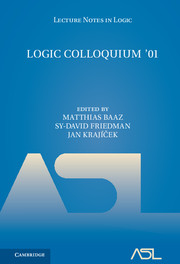An introduction to proofs of determinacy of long games
from TUTORIALS
Published online by Cambridge University Press: 31 March 2017
Summary
Abstract. We present the basic methods used in proofs of determinacy of long games, and apply these methods to games of continuously coded length.
From the dawn of time women and men have aspired upward. The development of determinacy proofs is no exception to this general rule. There has been a steady search for higher forms of determinacy, beginning with the results of Gale–Stewart [2] on closed length ω games and continuing to this day. Notable landmarks in this quest include proofs of Borel determinacy in Martin [5]; analytic determinacy in Martin [4]; projective determinacy in Martin–Steel [8]; and ADL(R) in Woodin [17]. Those papers consider length ω games with payoff sets of increasing complexity. One could equivalently fix the complexity of the payoff and consider games of increasing length. Such “long games” form the topic of this paper.
Long games form a natural hierarchy, the hierarchy of increasing length. This hierarchy can be divided into four categories: games of length less than ω · ω; games of fixed countable length; games of variable countable length; and games of length ω1.
Games in the first category can be reduced to standard games of length ω, at the price of increasing payoff complexity. The extra complexity only involves finitely many real quantifiers. Thus the determinacy of games of length less than ω · ω, with analytic payoff say, is the same as projective determinacy.
Games in the second category can be reduced to combinations of standard games of length ω, with increased payoff complexity, and some additional strength assumptions. The first instance of this is given in Blass [1]. The techniques presented there can be used to prove the determinacy of length ω ·ω games on natural numbers, with analytic payoff say, from ADL(R) + “R# exists.” In another, choiceless reduction to standard games, Martin and Woodin independently showed that AD + “all sets of reals admit scales” implies that all games in the second category are determined.
It is in the third category that the methods presented here begin to yield new determinacy principles. (The one previously known determinacy proof for games in the third category is a theorem of Steel [16], which applies to games of the kind described in Remark 1.1.)
Neeman [15] concentrates on third category games.
Information
- Type
- Chapter
- Information
- Logic Colloquium '01 , pp. 43 - 86Publisher: Cambridge University PressPrint publication year: 2005
